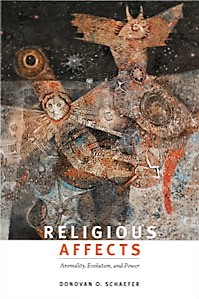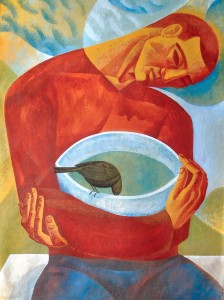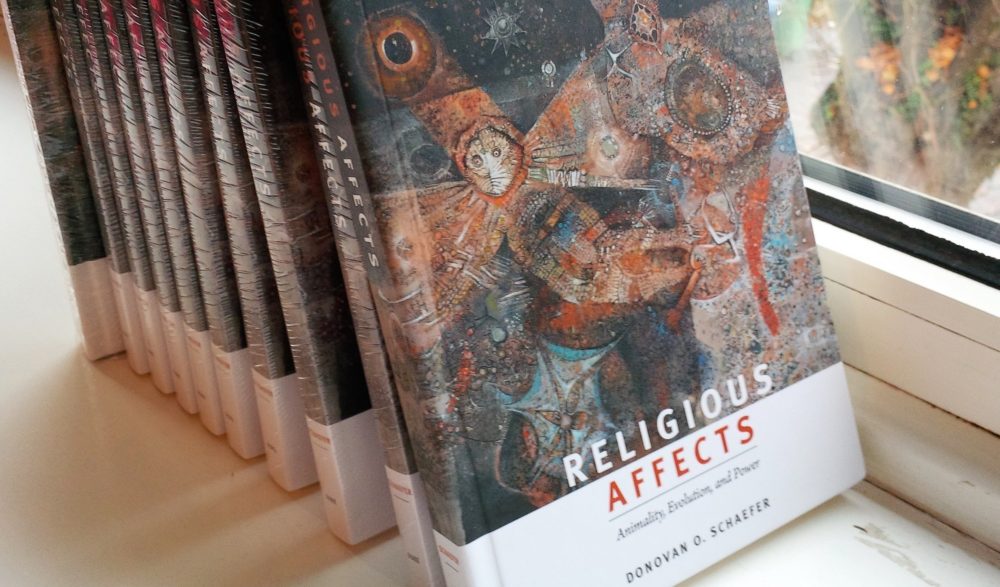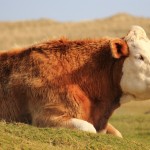Professor Donovan Schaefer, lecturer at Oxford University, is interviewed on his new book Religious Affects. He discusses how a positive understanding of animals can help us live out Christian values and that being attentive to the well-being of others, humans and animals alike, should be taken seriously as part of the everyday practice of living a life of compassion.
 Tell us about your latest book Religious Affects
Tell us about your latest book Religious Affects
Religious Affects is an argument that religions matter in the world because of the powerful emotions they generate more so than the beliefs they hold to be true. If we just look at religion solely in terms of a set of beliefs, we miss out on why religion is so important to people. Religions are powerful (for good or bad) because they are incredibly good conductors of emotion, not because of theological machinery. We human beings are emotional creatures first and foremost. And really, we wouldn’t have it any other way. Our religions (and, I would add, our different ways of being secular, including science itself) come out of that rich emotional foundation.
This leads to one of the main proposals of the book: that animal species other than us also have religion. Once we’ve acknowledged that human religion isn’t just about words on the page—that it’s actually a way of being in the world suffused with emotion—we realise that other animals have behaviours in their lives that may be religious. Jane Goodall, for instance, has described how some of the chimpanzees she has observed in the Kakombe Valley perform a strange “dance” at the base of a towering waterfall as it crashes down around them. Other primatologists have seen similar behaviour in front of thunderstorms, heavy rains, and even wildfires. The book asks: Do animals have religious worlds that are just as emotionally meaningful for them as ours are for us? I think the answer has to be yes.
 What inspired you to write it?
What inspired you to write it?
I think that many of the “common-sense” understandings floating around today of what it means to be a human and what it means to be an animal are deeply flawed. We’ve inherited some very bad ideas about who we are, I think as a result of certain philosophical trends from the beginning of the modern period that tried to use the template of Newtonian physics to understand human beings. Many ideas about the nature of animals that have been passed down to us are even worse. We’ve gotten stuck in the delusion that animals don’t have meaningful relationships with each other or with their worlds, an idea that would have been unthinkable to many ancient religious figures and philosophers. Religious Affects is an attempt to think in old ways and new about animals.
Can the study of animals influence how we approach Christianity?
I think so. The better we understand animals the better we can live out our own values. Violence is being done to animals on an extraordinary scale today. People of conscience of all faiths and non-faiths have been sold a bill of goods that this violence isn’t really violence—that animals don’t feel or don’t suffer when they are locked away in misery for the duration of their lives. This is wrong. Christians and non-Christians have formed powerful alliances to demand a more just world in historical struggles for liberation, from workers’ protections to civil rights. Venues like Sarx are the vanguard of a new conversation (within and between faiths) that aims to extend compassion to other animals as a way of fulfilling the command to love. Love means not only removing human-imposed suffering, but allowing other animals opportunities to flourish alongside us in new interspecies communities.
How might a Christian understand the Psalmist’s extolling (e.g. Psalm 148) of all creatures to praise God?
This is a great example of what I was saying before: many ancient religious thinkers would have found it strange to imagine animals as “soulless” in the way that we do. The Psalmist starts from the view that God’s glory calls forth a response from all of creation, rather than being jealously walled up in the fortress of humanity. You can see the same understanding in the Book of Jonah, in which the animals join with the inhabitants of Nineveh in penitence to avert disaster for their city. Aquinas believed much the same thing, that each animal had its own mode of excellence that was a way of giving praise to God. This has interfaith implications, as well. The Qur’an says something very similar. Surah 24 contains the verse “Seest thou not that it is Allah Whose praises all beings in the heavens and on earth do celebrate, and the birds (of the air) with wings outspread? Each one knows its own (mode of) prayer and praise. And Allah knows well all that they do.” Animals have their own ways of encountering the world in richly meaningful ways. Christians before the modern era often understood these emotionally rich moments of ecstasy as acts of worship on the part of other animals.
 What can Christians today learn from being mindful of their own materiality?
What can Christians today learn from being mindful of their own materiality?
Anyone living in the modern world is going to be confronted by a global belief system that calls on us to forget about our bodies and the embeddedness of ourselves in our environments. The libertarian doctrine that we are essentially disconnected from other people, places, and things is toxic to our self-understanding. It makes us overlook the profound importance of relationships, ecosystems, and even love itself. The climate change crisis unfolding today is already delivering misery to humans (and animals) in parts of the world that are not wealthy enough to absorb the shock of alterations in weather patterns affecting rainfall, growing periods, or heat indexes. It’s a result, in part, of seeing ourselves as superior to the material world, including our own bodily materiality. We assume that our own sense of free choice is paramount and don’t consider the after effects of our actions for others living in the world, human or animal, let alone the planet itself.
We live in the world in our bodies. The theologian John D. Caputo has written about the importance of real, physical bodies for Jesus’ ministry. He reminds us that Jesus came to feed those who were hungry, heal those who were ill, and comfort those who were ostracised. We need to take nurturing our physical well-being and the well-being of others—including other animals—seriously as part of the everyday practice of compassion.
Donovan Schaefer is Departmental Lecturer in Science and Religion at the University of Oxford. His book Religious Affects: Animality, Evolution, and Power is available now from Duke University Press. You can read an excerpt from the book here.




